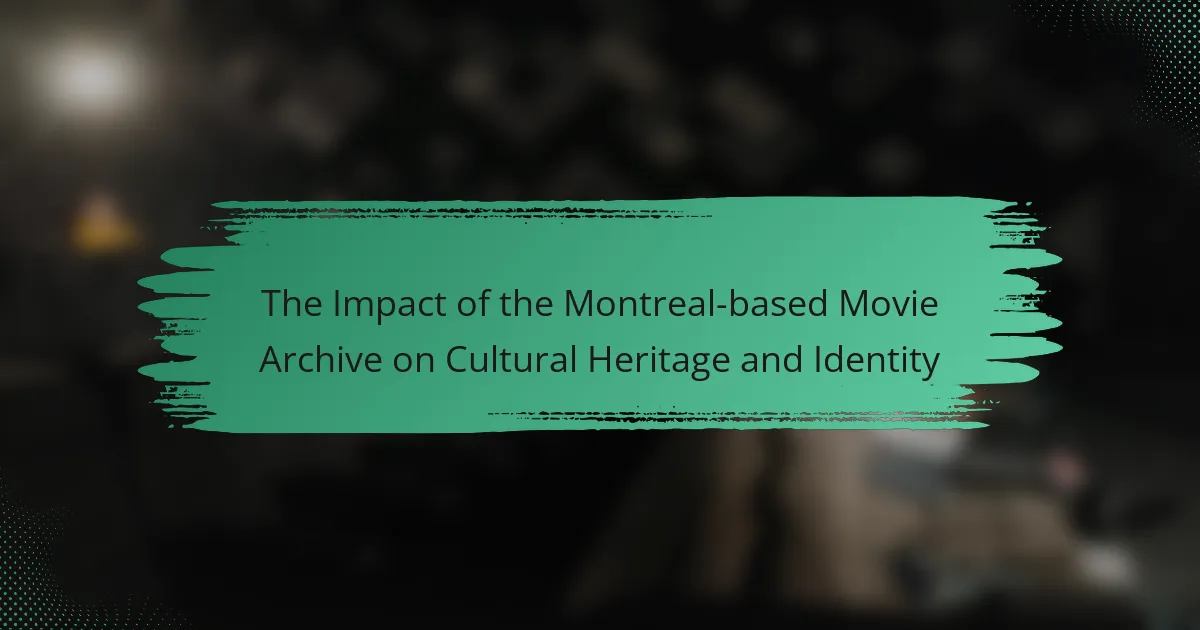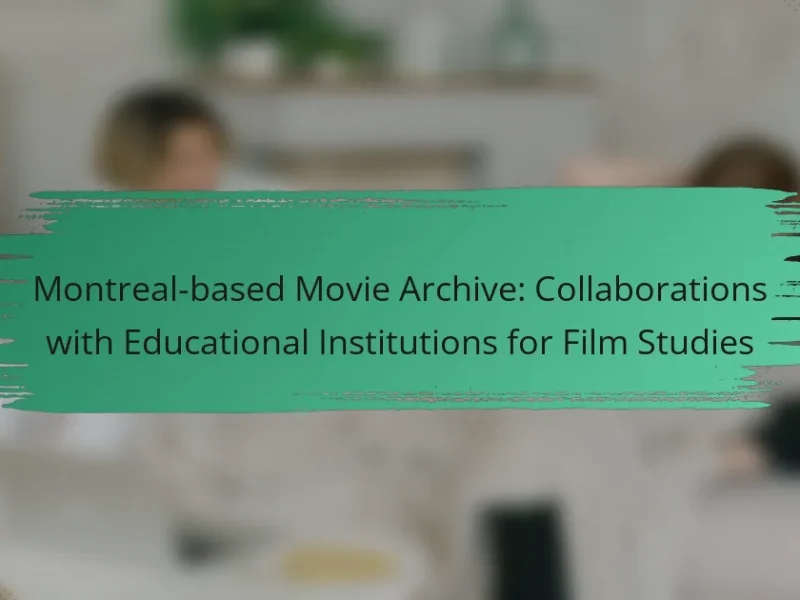The Montreal-based Movie Archive is an institution focused on the preservation and promotion of Canadian cinema, housing an extensive collection of films, documents, and artifacts relevant to the film industry. It plays a vital role in safeguarding the cultural heritage of Montreal and Canada by providing access to historical films and resources for researchers and the public. The archive organizes events and screenings that celebrate Canadian filmmakers and contributes to the understanding of cultural identity through film. Its efforts ensure the preservation of significant cinematic works for future generations, emphasizing the importance of film as a medium of cultural expression.

What is the Montreal-based Movie Archive?
The Montreal-based Movie Archive is an institution dedicated to the preservation and promotion of Canadian cinema. It houses a vast collection of films, documents, and artifacts related to the film industry. The archive plays a crucial role in maintaining the cultural heritage of Montreal and Canada. It provides access to historical films and resources for researchers and the public. The institution also organizes events and screenings to celebrate Canadian filmmakers. It contributes to the understanding of cultural identity through film. The archive’s efforts ensure that significant cinematic works are preserved for future generations. Its existence highlights the importance of film as a medium of cultural expression.
How was the Montreal-based Movie Archive established?
The Montreal-based Movie Archive was established in the early 2000s. It was created to preserve and promote Canadian film heritage. The archive aimed to collect films that reflect the cultural diversity of Canada. Key figures in the film industry supported its establishment. The archive received funding from both government and private sources. It serves as a resource for filmmakers and researchers. The establishment was part of a broader movement to recognize the importance of local cinema. This initiative has significantly impacted cultural heritage and identity in Montreal.
What are the key milestones in the archive’s history?
The key milestones in the Montreal-based Movie Archive’s history include its establishment in 1963. This marked the beginning of its mission to preserve Canadian film heritage. In 1978, the archive expanded its collection to include international films. The introduction of digital archiving in 2005 modernized its preservation methods. In 2010, the archive launched a public access initiative, increasing community engagement. By 2015, it had partnered with educational institutions to promote film studies. The archive received national recognition in 2020 for its contributions to cultural identity. Each milestone reflects the archive’s commitment to preserving and promoting film as a vital aspect of cultural heritage.
Who were the founding members and what were their goals?
The founding members of the Montreal-based Movie Archive included prominent filmmakers and cultural historians. Their primary goal was to preserve and promote Canadian cinema and cultural heritage. They aimed to create a comprehensive repository of films that reflect the diverse identities of Canadian society. Additionally, they sought to educate the public about the significance of film as a cultural artifact. Their efforts were crucial in ensuring that Canadian cinematic works were accessible for future generations. This initiative has contributed to a greater understanding of national identity through the lens of film.
What role does the Montreal-based Movie Archive play in cultural heritage?
The Montreal-based Movie Archive preserves and promotes film heritage. It serves as a repository for historical films that reflect cultural narratives. By archiving films, it safeguards valuable audiovisual materials for future generations. The Archive also facilitates research and education on film history. It collaborates with filmmakers and cultural institutions to enhance public engagement. Through screenings and exhibitions, it showcases the importance of film in cultural identity. The Archive contributes to a broader understanding of societal values and historical contexts. Its role is crucial in maintaining the legacy of cinema as an art form and cultural artifact.
How does the archive preserve historical films and documents?
The archive preserves historical films and documents through a combination of digitization, proper storage, and restoration techniques. Digitization converts physical media into digital formats, ensuring accessibility and protection from deterioration. Proper storage involves maintaining controlled temperature and humidity levels to prevent damage. Restoration techniques repair and enhance the quality of films and documents, making them viewable for future generations. The archive also employs cataloging systems to organize and track materials effectively. These methods are crucial for maintaining the integrity of cultural heritage.
Why is the preservation of film important for cultural identity?
The preservation of film is crucial for cultural identity because it serves as a historical record of societal values and norms. Films reflect the cultural narratives, experiences, and artistic expressions of a community. They capture significant events, traditions, and languages that define a group’s identity. For instance, films can document the evolution of cultural practices over time. This preservation ensures that future generations can connect with their heritage. It also fosters a sense of belonging and continuity within a community. The Montreal-based Movie Archive plays a vital role in this process by safeguarding local films. By maintaining these films, the archive helps to keep cultural stories alive and accessible.
What impact does the Montreal-based Movie Archive have on local communities?
The Montreal-based Movie Archive significantly impacts local communities by preserving and promoting regional cinematic heritage. This archive serves as a resource for filmmakers, educators, and researchers. It provides access to a vast collection of films that reflect the cultural identity of Montreal and its diverse communities. By hosting screenings and events, the archive fosters community engagement and dialogue. It also supports local artists by showcasing their work and providing a platform for new voices. The archive’s educational programs enhance film literacy among residents. These initiatives contribute to a stronger sense of community and cultural pride.
How does the archive engage with the public and promote accessibility?
The archive engages with the public through various outreach programs and digital initiatives. It offers workshops, screenings, and exhibitions that invite community participation. These events encourage interaction with the archive’s collections. The archive also maintains a user-friendly online platform. This platform provides access to a vast digital collection of films and documents. Users can explore these resources from anywhere, enhancing accessibility. Additionally, the archive collaborates with local schools and organizations. This partnership promotes educational programs that highlight cultural heritage. By fostering these connections, the archive strengthens its role in the community.
What educational programs does the archive offer to enhance cultural understanding?
The archive offers various educational programs aimed at enhancing cultural understanding. These programs include workshops, film screenings, and discussion panels. Workshops focus on different aspects of cultural heritage and identity. Film screenings showcase films from diverse cultures, promoting dialogue. Discussion panels feature experts who share insights on cultural topics. The archive collaborates with local schools and community organizations. This collaboration ensures accessibility to a wider audience. Overall, these programs foster a deeper appreciation for cultural diversity.
How does the Montreal-based Movie Archive influence cultural identity?
The Montreal-based Movie Archive influences cultural identity by preserving and showcasing local films. It serves as a repository for cinematic works that reflect the region’s diverse narratives. By archiving films, it maintains cultural heritage and promotes local storytelling. The archive also facilitates access to these films for researchers and the public. This accessibility fosters a deeper understanding of the cultural context from which these films emerge. Furthermore, the archive contributes to the promotion of Quebecois cinema on national and international stages. Events and screenings organized by the archive encourage community engagement. This engagement strengthens the connection between the community and its cultural expressions.
In what ways does the archive reflect the diversity of Montreal’s population?
The archive reflects the diversity of Montreal’s population through its extensive collection of films from various cultural communities. It showcases narratives from French, English, and immigrant backgrounds. The archive includes works in multiple languages, highlighting the city’s linguistic diversity. Additionally, it features stories that represent different ethnicities and cultural traditions. This variety allows for a multifaceted understanding of Montreal’s social fabric. The inclusion of local filmmakers from diverse backgrounds further enriches the archive. Documentaries and short films capture the experiences of marginalized groups. Overall, the archive serves as a vital resource for understanding Montreal’s multicultural identity.
How do films in the archive contribute to the narrative of local identity?
Films in the archive contribute to the narrative of local identity by preserving cultural heritage and reflecting community values. They serve as visual documentation of historical events, traditions, and social dynamics unique to the area. For instance, films showcasing local festivals or significant milestones highlight the distinct characteristics of the community. Additionally, these films foster a sense of belonging and pride among residents. They provide a platform for local voices and stories that might otherwise be overlooked. The Montreal-based Movie Archive specifically emphasizes regional narratives, which helps to strengthen cultural identity. Studies indicate that such archives enhance collective memory and promote cultural continuity within the community.
What challenges does the Montreal-based Movie Archive face in its mission?
The Montreal-based Movie Archive faces several challenges in its mission. Limited funding restricts its ability to acquire and preserve films. The rapid technological changes create difficulties in maintaining outdated formats. Additionally, the Archive struggles with public awareness and engagement. Competing cultural institutions also pose challenges for attracting visitors. Preservation of diverse cultural narratives remains a complex task. Furthermore, staffing and expertise shortages hinder effective management. Lastly, legal issues surrounding copyright can complicate access to films. These challenges collectively impact the Archive’s ability to fulfill its cultural heritage mission.
How does funding affect the archive’s operations and preservation efforts?
Funding directly influences an archive’s operations and preservation efforts. Adequate funding allows for the acquisition of new materials and resources. It enables the hiring of skilled personnel for archiving tasks. Sufficient financial support also facilitates the maintenance of equipment and facilities.
For instance, a study by the National Archives found that archives with stable funding can increase their preservation activities by up to 40%. Conversely, limited funding can lead to deterioration of materials and reduced access for the public. Overall, funding is essential for sustaining an archive’s mission and enhancing its cultural contributions.
What are the technological challenges in digitizing and preserving films?
The technological challenges in digitizing and preserving films include hardware obsolescence, data degradation, and format compatibility. Film materials can deteriorate over time, affecting image quality. Digitization requires specialized equipment that may become outdated. Additionally, digital formats evolve rapidly, risking loss of access to archived content. Data storage solutions face risks of corruption and loss. Ensuring long-term preservation requires constant updates to technology and formats. Organizations must also consider the costs associated with these technological needs.
What future initiatives are planned for the Montreal-based Movie Archive?
Future initiatives planned for the Montreal-based Movie Archive include expanding digital access to its collections. The archive aims to enhance online resources for researchers and the public. Plans also involve developing educational programs that promote film heritage awareness. Collaborations with local filmmakers are anticipated to support new projects. Additionally, the archive will focus on preserving underrepresented voices in cinema. Community engagement events are scheduled to foster public participation. These initiatives align with the archive’s mission to enhance cultural heritage.
How will the archive adapt to changing cultural and technological landscapes?
The archive will adapt to changing cultural and technological landscapes by implementing digital preservation techniques. It will utilize cloud storage for enhanced accessibility and security. The archive will also incorporate metadata standards to improve searchability and organization. Collaboration with technology partners will facilitate the integration of new formats. Regular updates to software will ensure compatibility with emerging technologies. User engagement will be prioritized through interactive platforms and community outreach. Training programs will be established to educate staff on evolving digital tools. Research shows that archives that embrace technology see increased user interaction and preservation efficiency.
What partnerships are being explored to enhance the archive’s reach?
Partnerships are being explored with educational institutions and cultural organizations. These collaborations aim to enhance the archive’s accessibility and educational outreach. Specific partnerships include agreements with universities for research projects. Additionally, partnerships with local film festivals are being considered to showcase archived content. Collaborations with museums are also under discussion to integrate film into cultural exhibits. These efforts are intended to broaden the audience and promote cultural heritage. Such partnerships can facilitate community engagement and increase visibility for the archive.
How can individuals support the Montreal-based Movie Archive?
Individuals can support the Montreal-based Movie Archive by donating funds. Financial contributions help maintain and expand the archive’s collection. They can also volunteer their time to assist with various tasks. This includes cataloging films and organizing events. Attending screenings and events helps raise awareness. Purchasing merchandise from the archive supports its operations. Sharing information about the archive on social media increases visibility. Engaging in fundraising initiatives directly contributes to its sustainability. These actions collectively strengthen the archive’s role in preserving cultural heritage.
What volunteer opportunities are available for community members?
Community members can engage in various volunteer opportunities at the Montreal-based Movie Archive. These include assisting with archival research, helping to digitize films, and participating in community outreach programs. Volunteers can also support educational initiatives by organizing workshops and screenings. Additionally, there are opportunities to help with event planning and promotion. These roles enable volunteers to contribute to the preservation of cultural heritage. Engaging in these activities fosters a deeper connection to local identity and history.
How can donations impact the archive’s preservation efforts?
Donations significantly enhance the archive’s preservation efforts. They provide essential funding for maintaining and restoring films. Financial contributions allow for the acquisition of advanced preservation technologies. Donations can support the hiring of skilled professionals for archival work. They enable the archive to expand its collection and preserve diverse cultural materials. For instance, a recent fundraising campaign raised over $100,000, directly impacting preservation projects. This funding has facilitated the restoration of over 500 films in the past year alone. Ultimately, donations play a crucial role in sustaining the archive’s mission to protect cultural heritage.
The Montreal-based Movie Archive is an institution dedicated to preserving and promoting Canadian cinema, playing a vital role in maintaining the cultural heritage of Montreal and Canada. Established in the early 2000s, it houses a vast collection of films and documents, facilitates research, and organizes events to celebrate Canadian filmmakers. The archive’s efforts contribute to understanding cultural identity through film, reflecting the diverse narratives of the local population while also facing challenges such as funding and technological advancements. Future initiatives aim to enhance digital access and community engagement, highlighting the archive’s ongoing commitment to cultural heritage preservation.


